As electric vehicles gather speed in the Thai automotive market, i-dac Bangkok’s Suchada Supakan and MI Group analyse the prospects for EV marketers and brands by examining consumers’ key purchase triggers and the points of connections across the different stages in their paths to purchase.
Electric vehicles (EVs) are gaining momentum in Thailand, but they face barriers to entry that are usually associated with new automotive technology.
So what are the prospects for EV brands and what do consumers expect from this novel automotive technology? What can brands do to ease any EV-related concerns that buyers may have? And how will businesses seize the EV opportunity among alternative fuel consumers?
In general, motorists have become more open to EVs as awareness about caring for the environment grows, especially among those who live in highly congested cities like Bangkok. But amid the usual concern over new technology, it is essential that brands identify who the early EV adopters are and further develop their marketing strategies.
Warin Tinprapa, Chief Strategy Officer of MI Group says: “The automobile segment is one of the top advertising spenders and this has continued to grow year on year. The arrival of alternative energy has injected new excitement into the automotive industry. The launch of new brands and models of their electric vehicle in 2021 received strong interest and response from the market. In addition, the multiple government measures such as reductions in import tax and reduction of excise taxes to support EV usage will stimulate the market for electric cars, making prices more competitive.”
Tinprapa adds, “the first brands to market BEV (battery electric vehicles) are at an advantage and are seen as market leaders with customers having better brand recall than those that came after.”
But holding interested customers back is the lack of confidence in the development of public charging points – consumers still see this as being in the early stages and not yet meeting market demand.
Nonetheless, there is positive sentiment for alternative fuel cars. While hybrid automotive technology has a long-established reputation, plug-in hybrid technology seems to have been interrupted by the excitement about the latest EVs recently launched in the Thai market.
- 79.4% of Thai automotive consumers are inspired by car innovation, while 73% are interested in alternative fuel cars (Hakuhodo Asia Car Survey, 2021).
- The degree of interest is 79% for EV, 65% for hybrid and 34% for plug-in hybrid.
- Those interested are mature and modern entrepreneurs and office workers aged 30-49, with middle-to-upper-class household income, married and not first-time car buyers, with a need for a replacement or an additional car.
- 72% of current non-EV vehicle owners are considering EV for their next car (Facebook, Let’s Grow Electric, TH Report 2021).

But while affordability is important, the charging infrastructure, driving capacity and battery lifespan are the primary EV-related concerns.
Being the “first in line” is also an attraction for EV prospects, who desire to upgrade to a new automotive model with technology that is economical and environmentally friendly.
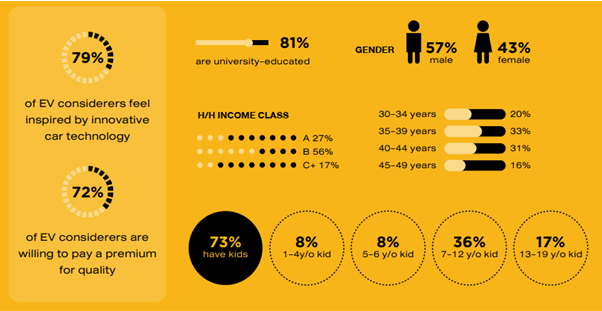
Key purchase triggers
A mix of emotional and functional components will trigger a prospect to buy an EV, with the top five attributes being green, innovative, economical, safe and a techie.
As for the emotional values expected from driving an EV, they are:
- 82.5% - Enjoy life with my car
- 80.9% - Simple pleasure of driving
- 79% - Feel relaxed when driving
- 78.8% - Feel inspired by an innovative car
- 78.8% - Fashionable and trendy
- 74.8% - Catches others’ attention
- 72.6% - A little beyond my means
- 67.2% - Not feel ashamed when driving my car
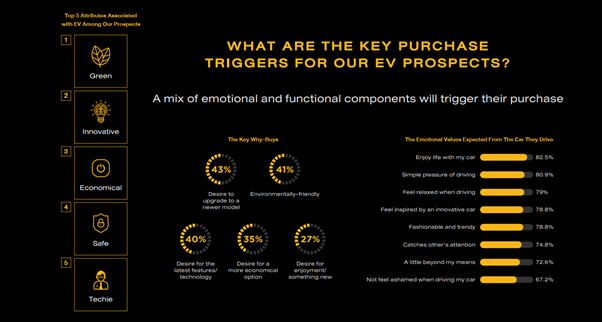
Profile of EV prospects
EV prospects currently drive passenger cars (55%), pickup trucks (42%) and SUVs (23%), and they are social media savvy.
61% of EV prospects take three to six months from getting to know an EV, to considering which model they should be purchasing and finalising their decision.
Making a purchase decision is a critical stage where EV brands can get involved – 91% of EV prospects take around one to three months to make their decision – and brands need to start tapping into their journey from the consideration stage to seal the deal in their final purchase decision stage.
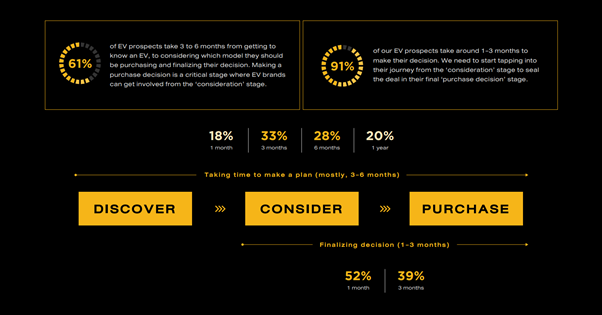
Getting on their radar with brand presence, along with generating brand reputation from the start, are crucial:
- 72% usually visit one authorised dealer
- 26% usually visit two authorised dealers
TV ads can drive reputation and massive reach, with Google and YouTube search to meet them, while running an EV on the street or parking an EV in high traffic space will tease the market, and social media posts/ads get on their radar. The top media touchpoints driving EV prospects’ discovery are:
- 64% - Car TV ads
- 49% - Online search
- 43% - Noticing cars on the street
- 42% - Online ads
- 34% - Social media posts/ads
To seal the deal with EV prospects, TV ads or TV auto programs help with brand recall three months leading up to a dealer or a motor event, while Google and YouTube search will leverage EV qualities. Google Search drives leads to the brand website and an auto expert’s endorsement conveys EV-ness and eases concern via TV, social channels and YouTube.
Brands can also maximise social ads to drive leads to brand pages/dealer/at-home test drive, with AR/VR service to address any questions in real time as well as deliver an at-home test drive.
What encourages a prospect’s purchase decision:
- 83% - Salesperson
- 64% - Conversations with friends
- 62% - Test drives
- 49% - Online search
- 41% - Motor show/auto expo
- 40% - Online VDO auto reviews
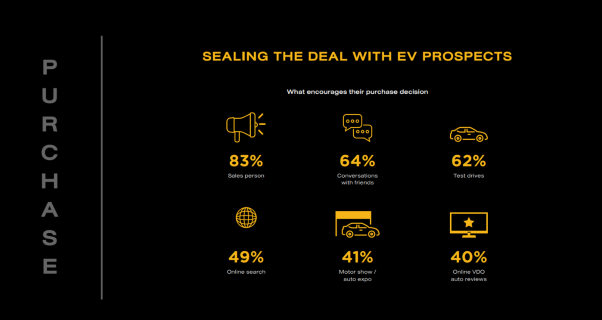
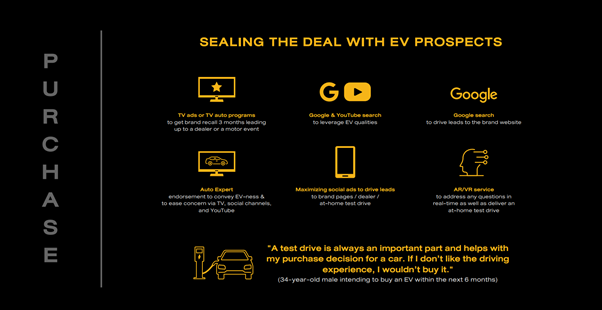
The message that connects
To move EV prospects from considerers, get on their radar and further identify who the EV prospects are, automotive brands need to start with building brand and product reputation in their communication, especially for this latest automotive technology where there are still doubts and concerns. The next step is to dial up the EV-ness and demonstrating the key reasons to buy, as these will help seal the deal.
Dialling up the EV-ness is not only about conveying a car’s functional benefits, but it also reinforces the techie’s attitude and desire for being the first in line.
This article is part of an ongoing series with i-dac Bangkok based on their quarterly i-dac Digital Flash series, featuring insights into trends in Thailand.
The series is led by the Digital Strategic Planning unit:
- Suchada Supakan, Head of Digital Strategic Planning
- Natthaporn Loetsakulcharoen, Senior Manager of Digital Strategic Planning
- Laddawan Thanlap, Senior Digital Strategic Planner
i-dac Bangkok is a digital agency specialising in performance media, branded content and data marketing.

